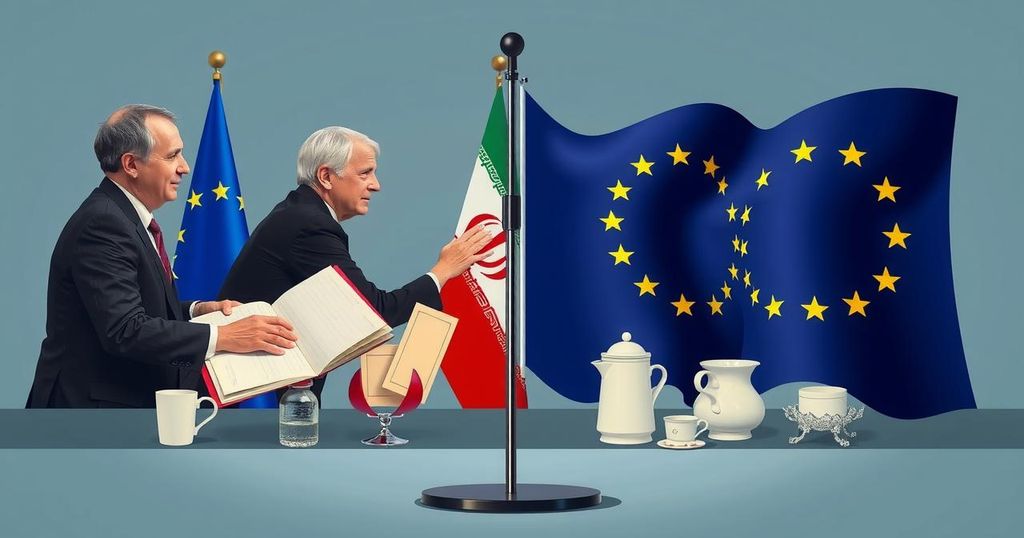Iran and European powers conducted discussions labeled as “frank and constructive” regarding Tehran’s nuclear program, focusing on issues such as sanctions lifting and regional stability. The talks signify ongoing efforts to navigate the challenges posed by Iran’s nuclear ambitions amidst the upcoming U.S. presidential transition, with both sides expressing commitment to diplomatic negotiations.
On Monday, representatives from Iran and European powers engaged in what was described as “frank and constructive” discussions regarding Tehran’s nuclear program. This meeting marked the second round of talks within a two-month timeframe, following a previous discreet conference in Geneva that involved the three European powers: Britain, France, and Germany, collectively known as the E3. While specific details of the discussions were not disclosed, both parties expressed their intent to pursue further negotiations.
Iranian Deputy Foreign Minister Majid Takht-Ravanchi met with his E3 counterparts to address various topics of mutual concern, prominently including the lifting of sanctions, aspects of Iran’s nuclear endeavors, and regional stability issues. Subsequent to the meeting, Deputy Foreign Minister Kazem Gharibabadi characterized the discussions as “serious, frank, and constructive,” emphasizing the need for detailed discussions on sanctions and nuclear protocols to facilitate an agreement.
The European representatives echoed these sentiments, branding the dialogue as both “serious and constructive,” and reiterated their commitment to a diplomatic resolution amid challenging circumstances. It was specified by Germany’s foreign ministry that these discussions were not negotiations but rather consultations aimed at addressing broad concerns.
Scheduled over a two-day period, these meetings aimed to vigorously tackle a range of issues, with primary emphasis on lifting sanctions imposed on Iran. Prior comments from France’s foreign ministry indicated a continuous effort towards a diplomatic resolution to the complex situation surrounding Iran’s nuclear ambitions, particularly as the inauguration of U.S. President-elect Donald Trump looms on January 20.
President Trump notably adopted a “maximum pressure” strategy during his earlier term, during which the U.S. withdrew from a pivotal nuclear agreement that had placed limitations on Iran’s nuclear activities. Following this withdrawal, Iran began to reduce its commitments, leading to heightened concerns from European officials over its actions. Recently, French President Emmanuel Macron warned that Iran’s nuclear advancements were nearing a critical threshold, while Iran dismissed these claims as “baseless”.
The dialogue comes at a time when the International Atomic Energy Agency noted significant increases in Iran’s enriched uranium production, bringing attention to the concerns surrounding its potential nuclear weapons capabilities. Although Iran maintains that its nuclear program is for peaceful purposes, there remains a pronounced urgency to re-establish the framework laid out in the 2015 Joint Comprehensive Plan of Action as September approaches, the deadline to trigger the snapback sanctions mechanism for violations of the agreement.
The context of these negotiations revolves around Iran’s nuclear program, which has been a focal point of international diplomacy for years. The 2015 Joint Comprehensive Plan of Action aimed to curtail Iran’s nuclear activities in exchange for sanctions relief. The U.S. withdrawal from this agreement in 2018 under President Trump significantly altered the dynamics, prompting Iran to gradually roll back its compliance with the terms. As concerns about nuclear proliferation grow, European powers are striving to revive the dialogue and find a diplomatic resolution.
In summary, the recent talks between Iran and European powers highlight the ongoing diplomatic efforts to address the complexities of Iran’s nuclear program and the lifting of sanctions. Both sides have expressed a willingness to continue dialogue in the face of challenges, particularly with the imminent inauguration of a new U.S. administration that may introduce changes to the current approach towards Iran. The urgency of these discussions is heightened by the proximity of deadlines related to the existing agreements and the rising tensions surrounding nuclear capabilities.
Original Source: www.euractiv.com






